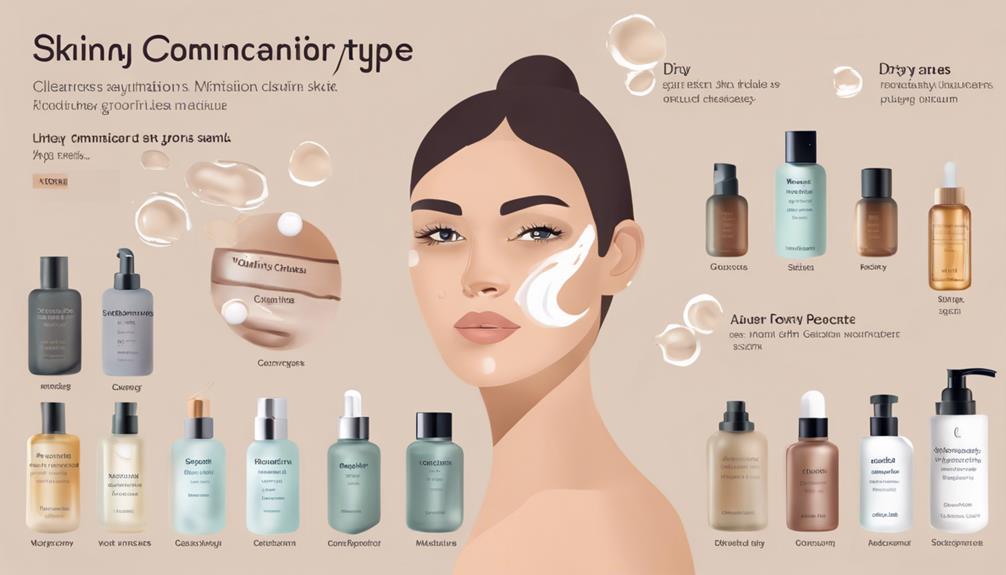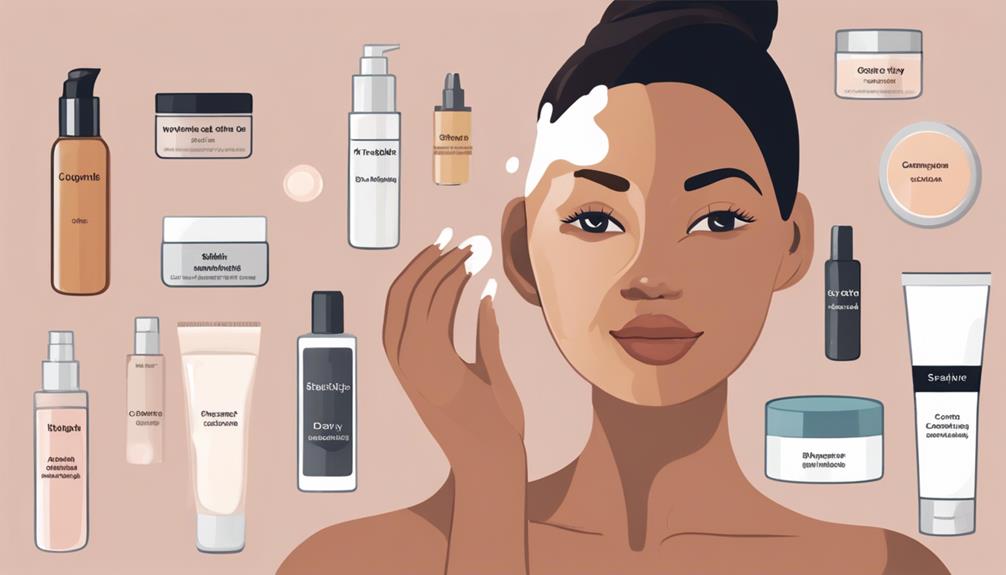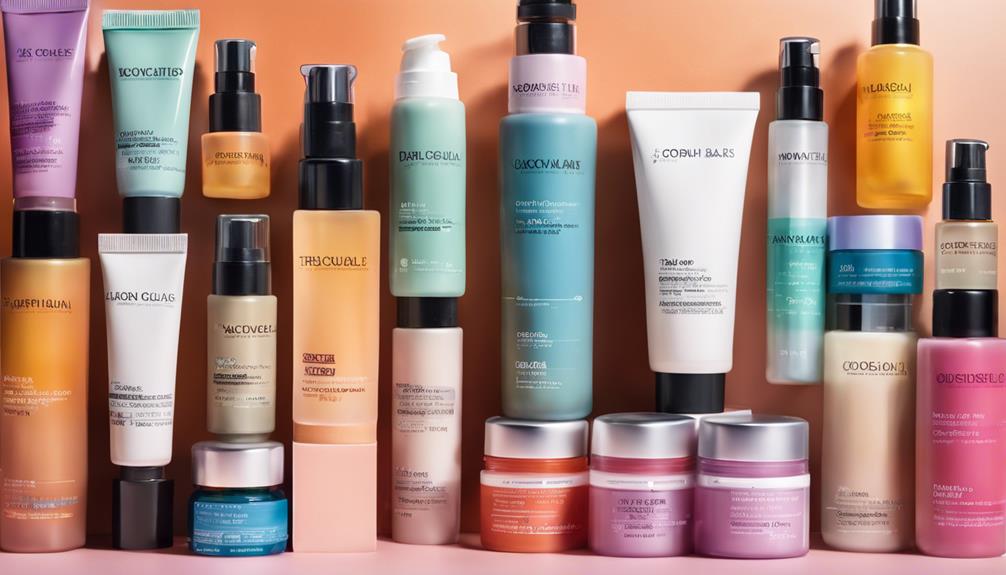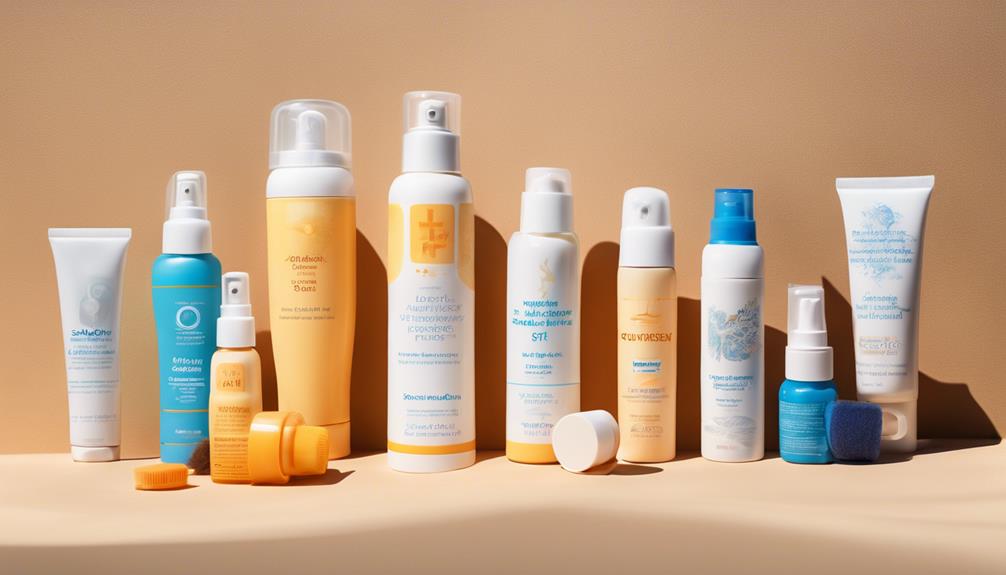How to Choose the Right Skincare Products for Your Skin Type
When it comes to selecting the most suitable skincare products for your skin type, the process can seem overwhelming with the myriad of options available. Understanding the nuances of your skin's needs is crucial in making informed choices that yield effective results. By taking a closer look at your skin type, concerns, and the ingredients that can address them, you are laying a strong foundation for a tailored skincare routine. But how can you navigate through the sea of products to find the perfect match for your skin? Stay tuned to discover essential tips and strategies to guide you in this skincare quest.
Understanding Your Skin Type
Understanding your skin type is crucial when it comes to choosing the right skincare products. Conducting a thorough skin analysis is the first step in determining whether you have dry, oily, combination, sensitive, or normal skin. This analysis involves examining factors like oil production, hydration levels, and sensitivity. By understanding your skin type, you can receive personalized recommendations tailored to address your specific needs.
Personalized recommendations are essential because they ensure that the skincare products you use are suitable for your skin type.
For instance, if you have oily skin, you may benefit from oil-free moisturizers and products containing salicylic acid to manage excess oil production.
On the other hand, individuals with dry skin might require richer, more hydrating formulations to combat dryness and flakiness.
Identifying Your Skin Concerns
To effectively address your skincare needs, it's crucial to identify your specific skin concerns. Understanding the key issues your skin is facing will help you choose the right products and treatments to target those concerns effectively. Here are four steps to help you identify your skin concerns:
- Analyze Your Skin: Take a close look at your skin to determine any specific problem areas such as acne, dryness, oiliness, or sensitivity.
- Consider Your Skin Goals: Think about what you want to achieve with your skincare routine. Do you want to reduce fine lines, even out your skin tone, or minimize pores?
- Consult a Professional: If you're unsure about your skin concerns, consider seeking advice from a dermatologist or skincare specialist who can provide insight into your unique needs.
- Keep a Skincare Journal: Track how your skin reacts to different products and environmental factors to pinpoint specific issues and problem areas.
Researching Key Ingredients
When researching skincare products, delving into the realm of key ingredients is essential for making informed choices that cater to your skin concerns. Conducting an ingredient analysis involves understanding the components of a product and how they can address your specific skin needs.
Look for ingredients like hyaluronic acid for hydration, salicylic acid for acne-prone skin, or retinol for anti-aging benefits. Investigating the ingredient compatibility is crucial as well. Some ingredients work synergistically, enhancing each other's effects, while others may cause irritation or negate the benefits of one another.
For instance, using products with vitamin C and niacinamide together can boost skin brightening effects. On the other hand, combining retinol with benzoyl peroxide may reduce the effectiveness of both. By researching key ingredients and their compatibility, you can tailor your skincare routine to maximize results and address your specific skin concerns effectively.
Choosing Cleansers for Your Skin Type
Exploring skincare products with the right ingredients is a vital step towards addressing your skin concerns effectively. When it comes to choosing cleansers tailored to your skin type, consider the following to ensure you're providing the best care for your skin:
- pH Balance: Opt for a cleanser that matches your skin's natural pH level to avoid stripping it of its protective barrier.
- Gentle Exfoliation: Look for cleansers with mild exfoliating agents like alpha hydroxy acids (AHAs) or beta hydroxy acids (BHAs) to help unclog pores and remove dead skin cells without causing irritation.
- Non-Comedogenic Formulas: Select cleansers labeled as non-comedogenic to prevent pore-clogging and breakouts, especially if you have oily or acne-prone skin.
- Hydrating Ingredients: Choose cleansers with hydrating ingredients such as hyaluronic acid or glycerin if you have dry skin to maintain moisture levels while cleansing.
Selecting the Right Moisturizer
Selecting the right moisturizer is a crucial aspect of any skincare routine, as it plays a significant role in maintaining skin health and addressing specific concerns effectively. When choosing a moisturizer, consider your skin type and any particular issues you want to target.
For dry skin, opt for richer, creamier formulas that provide intense hydration benefits. Those with oily or acne-prone skin should look for oil-free and non-comedogenic moisturizer options to prevent clogged pores. Combination skin can benefit from lightweight lotions that balance hydration without greasiness. Normal skin types have the flexibility to choose a wider range of moisturizers based on personal preference.
Remember to check the ingredient list for key hydrating components like hyaluronic acid, glycerin, or ceramides. These ingredients help lock in moisture and improve skin barrier function. By selecting the right moisturizer tailored to your skin's needs, you can achieve a healthy, glowing complexion.
Incorporating Serums and Treatments
To enhance your skincare routine, consider incorporating serums and treatments that target specific skin concerns and provide concentrated benefits.
Serum benefits:
- Hydration Boost: Serums are formulated with smaller molecules that penetrate deeper into the skin, providing intense hydration.
- Anti-Aging Properties: Many serums contain antioxidants and collagen-boosting ingredients that help reduce fine lines and wrinkles.
- Brightening Effect: Some serums contain vitamin C or niacinamide, which can help even out skin tone and fade dark spots.
- Acne-Fighting Formulas: Serums with salicylic acid or benzoyl peroxide can be effective in treating acne and preventing breakouts.
Treatment options:
When selecting treatments, look for options like:
- Retinol Creams: Effective in reducing fine lines, wrinkles, and improving skin texture.
- Chemical Peels: Help in exfoliating dead skin cells and promoting cell turnover.
- Acne Spot Treatments: Target specific blemishes without drying out the rest of your skin.
- Hydrating Masks: Provide deep moisturization and nourishment, leaving your skin supple and radiant.
Incorporating these serums and treatments into your skincare routine can help address your skin concerns effectively.
Sun Protection Essentials
To optimize your skincare regimen further, focus on shielding your skin from harmful UV rays with effective sun protection essentials. Sunscreen application is crucial in protecting your skin from the sun's damaging effects. Look for a broad-spectrum sunscreen with SPF 30 or higher to ensure adequate UV protection. Remember to apply sunscreen generously and reapply every two hours, especially if you're spending time outdoors.
UV protection is essential year-round, not just in the summer months, as UV rays can still penetrate through clouds and windows. Make sure to cover all exposed areas of your skin, including your face, neck, ears, and hands. Additionally, consider incorporating sun-protective clothing, sunglasses, and wide-brimmed hats into your routine for added defense against UV exposure.
Personalizing Your Skincare Routine
Personalize your skincare routine by tailoring it to your specific skin type and concerns. Creating a customized regimen with tailored products can make a significant difference in the health and appearance of your skin. Here's how you can personalize your skincare routine:
- Identify Your Skin Type: Determine whether you have dry, oily, combination, sensitive, or normal skin to choose products that cater to your specific needs.
- Address Your Skin Concerns: Whether it's acne, aging, hyperpigmentation, or sensitivity, select products that target your primary skin concerns.
- Consult a Dermatologist: If you're unsure about your skin type or the products to use, seek professional advice from a dermatologist who can recommend personalized skincare solutions.
- Trial and Adjust: Start with a basic skincare routine, introduce new products one at a time, and observe how your skin responds. Adjust your regimen as needed to find what works best for you.
Frequently Asked Questions
How Can I Determine if a Skincare Product Is Expired?
To determine if a skincare product is expired, check the shelf life indicated on the packaging. Signs of expiration include changes in smell, texture, or color. If unsure, err on the side of caution and replace it.
Is It Necessary to Change My Skincare Routine With the Seasons?
Adjusting your skincare routine with the seasons can benefit your skin's changing needs. Maintain skincare consistency while making seasonal adjustments. Consider lighter products in summer and richer ones in winter to keep your skin balanced and healthy.
Can I Use the Same Skincare Products on My Body and Face?
When it comes to Body vs Face Skincare, remember: what's good for one may not be ideal for the other. Different areas have unique needs. Also, keep an eye on Product Expiration dates to ensure effectiveness and safety.
What Should I Do if My Skin Reacts Negatively to a New Product?
If your skin reacts negatively to a new product, immediately stop using it. Try patch testing on a small area. Consider alternative products and adjust application. If issues persist, consult a dermatologist for personalized skincare recommendations.
Are Natural or Organic Skincare Products Always Better for My Skin?
When it comes to natural vs. organic skincare products, consider ingredient safety and environmental impact. Natural doesn't always mean better. Look for certified organic products with safe, effective ingredients for your skin's health and the environment's well-being.
Conclusion
In conclusion, remember to be patient and persistent in finding the perfect skincare products for your skin type. Personalize your routine with products that pamper and protect, targeting specific concerns with key ingredients. Practice proper sun protection and adjust your regimen as needed for optimal results. Stay savvy, select smartly, and savor your skin's newfound radiance!













